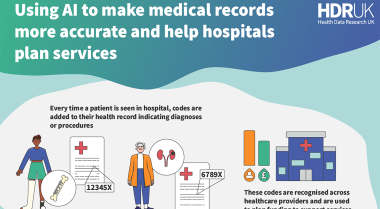£37.5m investment in Digital Innovation Hubs to tackle Britain’s biggest health challenges
16 July 2018
Faster development of new treatments for diseases like cancer, heart disease and asthma are set to emerge following a £37.5 million investment in new Digital Innovation Hubs across the UK.
The new hubs will help connect regional health and care data with biomedical data in secure environments. This will pave the way for NHS, academic researchers and industry innovators to harness scientific knowledge and emerging technologies to develop new drugs and devices and improve health services.
Funded through the Industrial Strategy Challenge Fund, the Digital Innovation Hubs will be led by Health Data Research UK (HDR UK), the national institute for data science in health, delivering on behalf of UK Research and Innovation.
Between three and five hubs will be created across the UK over the next three years to enable innovation that will have a long-lasting impact on improving the health of the public. The hubs will provide safe, secure and controlled environments for data and enable NHS clinicians to work together with health researchers, data scientists, computer scientists, ethicists, social scientists and the public.
The UK has some of the richest health data of anywhere in the world. However, these datasets across health, care, genomics and biomedicine are fragmented making it difficult, sometimes impossible, to access and use for research purposes. This causes delays and, in some cases, prevents accredited researchers and industry innovators from analysing data to help deliver better care and improve health for patients, society and for future generations.
The Digital Innovation Hubs will securely and safely connect data across regions of 3-5 million people and create an accessible layer of data from GP practices, hospitals, social and community care providers, alongside genetic and biomedical information and other datasets for research and innovation. Combined with the unique research expertise across UK universities and industry, this initiative offers an unprecedented opportunity to use data to improve the long-term health of the public. It will also create new jobs in the UK’s life sciences economy, drive medical innovation and ensure that NHS patients benefit from new treatments first.
HDR UK will work in partnership to establish the hubs and ensure data is used responsibly and ethically to benefit society. The hubs will follow the strict safeguards underpinning health data security and access as set by UK regulatory bodies and will be transparent in how and why data is used, stored and shared.
Safe, secure and trusted use of health data has a long track record of enhancing public health and facilitating innovative research. High profile examples include:
- revealing the indisputable link between the effects of air pollution and smoking on developing lung cancer and heart disease;
- discovering new genetic causes of disease that allows tailored treatments in cancer, arthritis and asthma;
- reducing life-threatening complications of diabetes such as amputation and blindness, whilst shedding light on the genetic causes of disease.
The Digital Innovation Hubs programme will launch this Autumn with HDR UK seeking, and learning from, local examples of research partnerships that are already working in practice. These ‘demonstrator projects’ will test approaches that will inform the design and delivery of the Digital Innovation Hubs. Following this, in Spring 2019, HDR UK will invite regional partnerships of NHS, academia and industry to bid to establish a Digital Innovation Hub.
The hubs will complement other initiatives across the UK, including the NHS’ Local Health and Care Record Exemplar programme, which is joining up local health and care data for individual care and planning purposes, and the work of NHS Digital to create a Data Services Platform.
The Digital Innovation Hubs programme is part of the Industrial Strategy Challenge Fund Wave 2 £210 million ‘Data to Early Diagnosis and Precision Medicine’ theme. Closely related investments within this theme include:
- Genome sequencing using UK Biobank volunteers, and
- A network of up to six Centres of Excellence in digital pathology and imaging, including radiology.
Health and Social Care Secretary Matt Hancock said:
“Over its 70 years the NHS has been the forefront of innovation, including the discovery of DNA and the adoption of CT scanners. These hubs will allow researchers to unlock new advances by harnessing the huge potential of data so the NHS will continue to lead the way in technology that improves patient care, makes taxpayers’ money go further and lessens the workload for staff.”
Ian Campbell, Interim Executive Chair of Innovate UK, said:
“Digital Innovation Hubs – an integral part of the wider Data to Early Diagnostics and Precision Medicine challenge – support our ambition to sustain the UK as a world-leader in life sciences and have a long-lasting impact on improving public health. Once established, these Hubs will ensure the UK’s status as a prime location for real-world clinical trials, while stimulating growth of UK companies, and encouraging inward investment in diagnostics, imaging, AI and pharmaceuticals.
“This initiative also has the potential to transform the health and wellbeing of individuals, their families and future generations through the ability to make better use of data at scale. As a UK Institute, Health Data Research UK – with its strong academic, NHS and industry connections – is well placed to deliver the Digital Innovation Hubs.”
Professor Andrew Morris, Director of Health Data Research UK, said:
“Our approach at Health Data Research UK is built on the principles of ethical and trustworthy use of data that is in the interest of the society we serve. Our existing HDR UK centres of research excellence, constituting 22 Universities and NHS partners across the UK have an outstanding track record of using health data safely and securely to derive new knowledge, scientific discovery and insight. We know from international research that the best performing health systems in terms of patient safety and quality of care are research and data enabled. We expect the creation of Digital Innovation Hubs will help deliver direct benefits to the NHS and the 65 million citizens of the UK.”
Dr Natalie Banner, Lead for Understanding Patient Data at Wellcome, said:
“Today’s announcement [about the Digital Innovation Hubs] represents a real opportunity to learn from exciting local projects that are working with patients and clinicians to join up and make better use of the data collected in clinical care. There is enormous potential to unlock the benefits of this data if it is done responsibly, with the support of patients, clinicians and publics. It is really positive to see HDR UK emphasising the importance of creating a trustworthy system as they approach these complex challenges.”
Simon Denegri OBE, NIHR National Director for Patients, Carers and the Public, said:
“I very much welcome today’s announcement and the exciting opportunities it offers to strengthen our partnership with patients, carers and the public in health data research building on what has already been achieved by Understanding Patient Data, our medical research charities and many others.
The Digital Innovation Hubs will be influential centres in exploring how we can further involve and engage people in this area of research and for sharing this learning with others across the UK health research and care system and internationally. By building on local and regional partnerships I hope we can also connect with a more diverse range of people and communities for whom health data research is relevant and important.”
ENDS
NOTES TO EDITORS
About Health Data Research UK
Health Data Research UK (HDR UK) is the national Institute for data science in health. Our UK team of experts develop and apply cutting-edge data science approaches to clinical, biological, genomic and other multi-dimensional health data to address the most pressing health research challenges facing the public. Our mission is to make game-changing improvements in the health of patients and populations through research and innovation.
www.hdruk.ac.uk
About UK Research and Innovation
Innovate UK is part of UK Research and Innovation, a non-departmental public body funded by a grant-in-aid from the UK government. For more information visit www.ukri.org. Innovate UK drives productivity and economic growth by supporting businesses to develop and realise the potential of new ideas, including those from the UK’s world-class research base.
We connect businesses to the partners, customers and investors that can help them turn ideas into commercially successful products and services and business growth. We fund business and research collaborations to accelerate innovation and drive business investment into R&D. Our support is available to businesses across all economic sectors, value chains and UK regions.
About the Office for Life Sciences
The Office for Life Sciences (OLS) champions research, innovation and the use of technology to transform health and care service. We aim to improve patient outcomes and support economic growth. OLS is part of the Department of Health and Social Care and the Department for Business, Energy & Industrial Strategy.
CONTACT
For further details or interview requests please contact Amanda White, Health Data Research UK, on 07841 538380 or Amanda.white@hdruk.ac.uk



